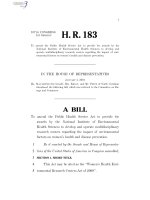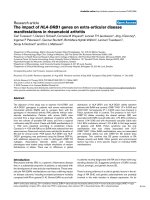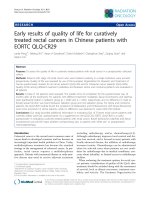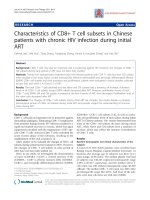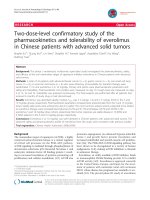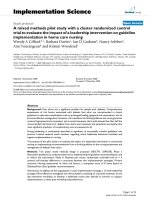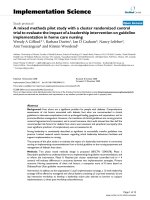Impact of JAK2V617F mutation burden on disease phenotype in Chinese patients with JAK2V617F-positive Polycythemia vera (PV) and Essential thrombocythemia (ET)
Bạn đang xem bản rút gọn của tài liệu. Xem và tải ngay bản đầy đủ của tài liệu tại đây (432.6 KB, 7 trang )
Int. J. Med. Sci. 2016, Vol. 13
Ivyspring
International Publisher
85
International Journal of Medical Sciences
Research Paper
2016; 13(1): 85-91. doi: 10.7150/ijms.10539
Impact of JAK2V617F Mutation Burden on Disease
Phenotype in Chinese Patients with JAK2V617F-positive
Polycythemia Vera (PV) and Essential thrombocythemia
(ET)
Shixiang Zhao1,2,3*, Xiang Zhang1,2*, Yang Xu1,2, Yufeng Feng1,2, Wenhong Sheng1,2, Jiannong Cen1,2, Depei
Wu1,2, Yue Han1,2
1.
2.
3.
Department of Hematology, The First Affiliated Hospital of Soochow University, No.188.Shizi Street, Suzhou, 215006, P.R. China.
Jiangsu Institute of Hematology, Key Laboratory of Thrombosis and Hemostasis of Ministry of Health, The First Affiliated Hospital of Soochow University,
Suzhou, 215006, P.R. China.
Department of Hematology, The First People's Hospital of Yunnan Province, No.154.Jinbi Road, Kunming, 650100, P.R China.
*Co-first author
Corresponding authors: Yue Han, De-Pei Wu; Jiangsu Institute of Hematology, Key Laboratory of Thrombosis and Hemostasis of Ministry of Health, The
First Affiliated Hospital of Soochow University, No.188 Shizi Street, Suzhou 215006, P.R. China. Telephone: 86-0512-67781856 Fax: 86-512-67781850 E-mail:
,
© Ivyspring International Publisher. Reproduction is permitted for personal, noncommercial use, provided that the article is in whole, unmodified, and properly cited. See
for terms and conditions.
Received: 2014.09.13; Accepted: 2015.11.26; Published: 2016.01.25
Abstract
Most patients with polycythemia vera (PV) and half of essential thrombocythemia (ET) possess an
activating JAK2V617F mutation. The objective of this study was to better define the effect of
JAK2V617F mutant allele burden on clinical phenotypes in Chinese patients, especially thrombosis.
By real-time polymerase chain reaction (RT-PCR), the JAK2V617F mutation burden was detected
in 170 JAK2V617F-positive patients, including 54 PV and 116 ET. The results showed that
JAK2V617F allele burden was higher in PV than in ET (P< 0.001). Higher percentage of patients had
JAK2V617F allele burden over 20% in PV than in ET (68.5% VS 26.7%) (P< 0.001). In PV patients,
higher JAK2V617F allele burden was observed in female (P< 0.05) and leukocytosis patients (WBC
above 10×109/L) (P< 0.001). Meanwhile, ET patients showed increased JAK2V617F allele burden in
the group with higher hemoglobin (HGB above 150g/L) (P< 0.05), leukocytosis (WBC above
10×109/L) (P< 0.001), splenomegaly (P< 0.05) and thrombosis (P< 0.05). In conclusion, the
JAK2V617F mutation allele burden is higher in Chinese patients with PV than ET. In PV patients,
JAK2V617F mutation burden had influence on WBC counts. And the clinical characteristics of ET
patients, such as WBC counts, hemoglobin level, splenomegaly and thrombosis, were influenced by
JAK2V617F mutation burden. Male, high hemoglobin (HGB above 150g/L), and increased
JAK2V617F mutation burden (JAK2V617F allele burden ≥16.5%) were risks of thrombosis (P<
0.05) for ET patients by Logistic Regression.
Key words: Essential thrombocythemia; Polycythemia vera; JAK2V671F mutation allele
burden; Thrombosis.
Introduction
Philadelphia chromosome-negative chronic
myeloproliferative neoplasms (Ph- MPN) are clonal
hematopoietic diseases which include polycythemia
vera (PV), essential thrombocythemia (ET) and primary myelofibrosis (PMF). A gain-of-function point
mutation has been reported in the Janus 2 tyrosine
kinase (JAK2) gene, which increases JAK2 kinase activity and has the potential to affect clinical outcomes
[1-2]. The JAK2V617F mutation is presented in about
95% of PV patients, and in approximately 50% of ET
Int. J. Med. Sci. 2016, Vol. 13
86
and PMF patients [3–4].
Homozygosity of JAK2V617F mutation is due to
mitotic recombination [2]. It is rarely observed in patients with ET, whereas about one-third of patients
with PV have homozygous JAK2V617F mutation
[3-4]. Akada H et al generated an inducible
JAK2V617F knock-in mouse, which evoked all major
features of human polycythemia vera [5]. Higher
JAK2V617F allele burden in PV than that in ET had
been reported in several studies [6-8]. Previous studies have indicated that more than 50% of JAK2V617F
mutation to be homozygous and 50% was regarded as
the cut-off value to analyze the impact of JAK2V617F
mutation burden on disease phenotype [8-9]. However, since there were mixed wild type cells in the
total cells harboring both homozygous and heterozygous mutation, the actual burden of homozygous
JAK2V617F mutation would be under 50%.
An increase in JAK2V617F mutation is associated
with higher expression of downstream target genes
[10–12] and enhanced granulocyte activation [6].
Several studies have reported the relationships between the mutant allele burden and clinical phenotypes [13-14, 20]. The impact of JAK2V617F mutation
burden on several clinical parameters such as WBC
counts, haemoglobin concentration, platelet counts,
spleen size and thrombosis – especially for thrombotic
events had been demonstrated in MPN patients
[13-14]. In addition, association between JAK2V617F
mutation burden and thrombotic risk has also been
reported [15-16].
The onset of these diseases is usually gradual
and associated with elevated number of blood cells
and splenomegaly. In some patients the onset is presented with thrombus and bleeding. The prevalence
of overt MPN and that of JAK2V617F mutation in
Korean patients with splanchnic vein thrombosis
(SVT) were lower than in previous reports [17]. The
association between JAK2V617F mutation burden and
clinical phenotype in Chinese patients is unknown.
We investigated this mutation in a cohort of 170
JAK2V617F-positive patients with PV and ET to better
understand the effect of the JAK2V617F mutant allele
burden on survival of Chinese patients and its relationship to disease-related complications, especially
thrombosis.
Patients and methods
Study population
There were 300 patients diagnosed with PV and
ET at our institute from July 2009 to December 2011,
and JAK2V617F mutation was identified in 186 cases
including 64 PV and 122 ET. The mutation-positive
rates was 95.5% (64/67) in PV patients and 52.4%
(122/233) in ET patients. Notably, only 170 specimens
including 54 PV and 116 ET were involved in this
study. All patients in this study met the World Health
Organization (WHO) criteria published in 2008 for the
diagnosis of MPN, and written informed consent from
the subjects were obtained prior to the collection of all
samples. The general characteristics of the patients are
shown in Table 1 and splenomegaly was determined
based on ultrasound investigations.
Table 1. Clinical characteristics of 170 patients with JAK2V617F mutation.
Age, years
≤60
>60
Gender
M
F
Hemoglobin (g/L)
>150
≤150
Median
WBC (×109/L)
≤10
>10
Median
PLT (×109/L)
>300
≤300
Median
Spleen
Splenomegaly
Normal spleen
Thrombosis
Yes
No
PV (N=54)
JAK2V617F burden (Mean, %)
32(59.3%)
22(40.7%)
41.7%
33.6%
30(55.6%)
24(44.4%)
31.4%
45.3%
54(100%)
0
196(176-242)
37.1%
-
12(22.2%)
42(77.8%)
18.62(3.1-43.37)
12.1%
43.7%
38(70.4%)
16(29.6%)
382(102-941)
36.8%
37.6%
13(28, 46.4%)
15(28, 53.6%)
46.0%
39.4%
6(16, 37.5%)
10(16, 62.5%)
40.8%
45.8%
P Value
0.447
ET (N=116)
JAK2V617F burden (Mean, %)
53(45.7%)
63(54.3%)
16.3%
17.3%
50(43.1%)
66(56.9%)
15.0%
18.1%
47(40.5%)
69(59.5%)
143(64-187)
27.0%
14.6%
35(30.2%)
81(69.8%)
15.02(3.46-96.71)
3.2%
21.9%
116(100%)
0
872(428-2860)
16.5%
-
15(56, 26.8%)
41(56, 73.2%)
28.7%
12.5%
23(71, 31.0%)
48(71, 69.0%)
22.3%
14.1%
0.046*
P Value
0.572
0.455
-
0.023*
0.000*
0.000*
0.954
-
0.402
0.030*
0.645
0.018*
Abbreviations: F, female; M, male; PLT, platelet count; WBC, white blood cell; *P< 0.05.
Int. J. Med. Sci. 2016, Vol. 13
JAK2V617F mutational analysis and methods
Heparin anti-coagulated bone marrow was collected from patients, and then mononuclear cells were
separated by Lymphocyte separation medium. Genomic DNA was extracted from mononuclear cells
using DNA isolation kit (Qiagen, Courtaboeuf,
France) according to the manufacturer’s instructions,
and stored in aliquots at −80℃ until further use.
The presence of JAK2V617F mutation was
screened by allele specific polymerase chain reaction
(PCR) by using PCR System 2700 (Applied Biosystems, Singapore, CA, USA). There were two forward
primers and one reverse primer. The primer sequences of JAK2 were as follows:
Forward primer 1 (F1, wild type): 5'-ATCT
ATAGTCATGCTGAAAGTAGGAGAAAG-3'.
Forward primer 2 (F2, mutation type):
5'-AGCATTTGGTTTTAAATTATGGAGTATGTT-3'.
Reverse primer (R): 5'-CTGAATAGTCCTAC
AGTGTTTTCAGTTTCA-3'.
The 25μl of PCR mixture consisted of 12.5μl of
2×Taq MasterMix (ComWin Biotech, Beijing, China),
1.2μl of F1, 1.3μl of F2, 2.5μl of R, 5.5μl of deionized
water, and 2μl of samples including about 8ng of genomic DNA. The reactive condition involved preliminary denaturation at 94°C for 11 min, followed by 36
cycles of denaturation at 94°C for 30s, annealing at
55°C for 30s, extension at 72°C for 30s, followed by a
final elongation step at 72°C for 6min, and then
maintained at 10°C. The amplified products were
separated based on molecular weight by electrophoresis using a 2% agarose gel. The amplified PCR
products were sequenced by using the BigDye Terminator chemistry (Applied Biosystems) and analysed on an ABI 3100 capillary sequencer.
JAK2V617F mutation burden
All 170 patients with JAK2V617F mutation were
screened using allele specific PCR assay. These positive samples were detected using Real-time polymerase chain reaction (RT-PCR) with the 7500 real-time
PCR system (Applied Biosystems, Hayward, CA,
USA).
Forward primer: 5'-AGCTTTCTCACAAGCAT
TTGGTT-3'.
Reverse primer: 5'-CAAAAACAGATGCTCT
GAGAAAGG-3'.
The TaqMan MGB probe T (mutation type):
5'-VIC-AATTATGGAGTATGTTTCTGTGGA-3'
MGBNFQ.
The TaqMan MGB probe G (wild type):
5'-FAM-TAAATTATGGAGTATGTGTCTGT-3'
MGBNFQ.
87
The primers were purchased from Invitrogen
(Invitrogen, USA) and the TaqMan MGB probes were
purchased from Applied Biosystems (Hayward,
USA). The RT-PCR mixture (25µL final volume) contained 12.5μl Platinum SuperMix-UDG (Invitrogen,
USA), 0.1μl ROX, 0.5μl 10μM forward primer, 0.5μl
10μM reverse primer, 0.3μl 10μM probe T, 0.3μl 10μM
probe G, DNA template (total for about 100ng), and
deionized water. Amplification was performed by a
standard protocol recommended by the manufacturer
(50°C for 2 min; 95°C for 10min; 40 repeated cycles of
95°C for 15s, 55°C for 20s and 72°C for 1min). The
reaction of each sample was run in triplicates. The
JAK2V617F proportion was calculated from cycle
threshold (CT). Every sample has a value of ΔCT,
which is the difference of the values of CT between
the two probes. The ratio of JAK2V617F mutation to
wildtype was 2-ΔCT. The proportion of JAK2V617F
mutation was that 2-ΔCT was divided by one plus 2-ΔCT.
Statistical analysis
Numerical variables were tested for normal distribution with the Kolmogorov-Smirnov test. Data are
expressed as mean ± standard deviation (SD). Statistical analysis was either t-test or non-parametric
Mann-Whitney-Wilcoxon U test, based on the distribution of the studied variable. The non-parametric
Pearson's product-moment correlation analysis was
used to test for the relationship between JAK2V617F
mutation burden and different clinical variables. For
normally distributed variables, Pearson correlation
was used. Comparisons of categorical variables between groups were carried out using the χ2 test. Logistic Regression was used to test for the influence of
many factors on categorical variables. Cox proportional hazard regression was used to test the impact of
different covariates on risk of thrombosis in ET patients. And all tests for statistical significance were
two-tailed and P values less than 0.05 were considered to be statistically significant. Kaplan-Meier
analysis was used to examine whether age (<60 years
=0; ≥60 years =1), gender (male=0; female=1), and
JAK2V617F mutation status (<37.1% JAK2V617F allele
burden=0, ≥37.1 JAK2V617F allele burden=1 for PV;
and <16.5% JAK2V617F allele burden=0, ≥16.5%
JAK2V617F allele burden=1 for ET) were related with
PV and ET patients’ survival respectively.
Results
The accuracy of PCR assay in detecting
JAK2V617F mutation
JAK2V617F mutation status was screened by
three primers allele specific PCR assay using genomic
DNA as a template. The amplified products were
Int. J. Med. Sci. 2016, Vol. 13
separated by electrophoresis on a 2 % agarose gel. The
mutant DNA was detected using RT-PCR and confirmed by sequencing. The results were consistent
between allele specific PCR and RT-PCR which confirmed that the RT-PCR method to detect the
JAK2V617F mutation burden was feasible.
JAK2V617F mutation status and patients’
characteristics
Table 1 summarizes clinical characteristics of all
the 170 JAK2V617F positive patients (PV=54 and
ET=116). Among these patients, 80 were male and 90
were female. The median age at diagnosis was 60
years (ranging from 11-89 years). Regarding leukocyte
count, 47 (27.7%) patients had no leukocytosis (WBC
low 10×109/L), the other 123 (72.3%) had leukocytosis
(WBC over 10×109/L). PV patients with leukocytosis
(WBC above 10×109/L) had higher JAK2V617F allele
burden than the control group (WBC low 10×109/L)
(P< 0.001). And in PV patients, the median of WBC
counts was 18.62×109/L, while it was 15.02×109/L in
ET patients (P< 0.01). In ET with high hemoglobin
level, the mean JAK2V617F mutation burden was
more than those without elevated hemoglobin level
(P< 0.05) (Table 1). Spleen size was recorded in 84 of
the 170 patients. Among them, 28 patients (33.3%) had
splenomegaly at the time of diagnosis. The proportion
of splenomegaly is 46.4% in PV and 26.8% in ET (P
<0.05) (Table 1). 15 ET patients with splenomegaly
had significantly (P <0.05) higher JAK2V617F allele
burden (mean = 28.7%, ranging from 0.1–67.6%) when
compared to patients without splenomegaly (mean =
12.5%, ranging from 0.1–82.3%) (P< 0.05) (Table 1).
However, there was no difference between PV patients with or without splenomegaly (P> 0.05) (Table
1).
For patients with ET at diagnosis, the Pearson's
product-moment correlation analysis showed a direct
correlation between JAK2V617F mutant allele burden
and hemoglobin concentration (r= 0.395, P= 0.001),
WBC count (r= 0.453, P= 0.000), spleen size (r= 0.321,
P= 0.001), and thrombosis (r= 0.421, P= 0.000). And for
patients with PV at diagnosis, a direct correlation was
observed between JAK2V617F mutant allele burden
and WBC count (r= 0.503, P= 0.000), and gender (r=
0.287, P= 0.041).
JAK2V617F mutation burden in PV and ET
Median JAK2V617F allele burden for all patients
was 15.6% (ranging from 0.1–96.2%; 33.2% in PV and
7.0% in ET); JAK2V617F allele burden in PV was
significantly higher than in ET (P< 0.001) (Figure 1).
Table 2 showed the proportion of JAK2V617F allele
burden in PV and ET. The proportion of JAK2V617F
allele burden which is more than 20% was 68.5% in
88
PV patients, while only 26.7% of the ET patients had
such burden level (Chi-Squared test, P <0.001).
Table 2. JAK2V617F allele burden in PV and ET.
Allele burden
>50%
20~50%
1~20%
<1%
PV N=54 (%)
19 (35.2)
18 (33.3)
11 (20.4)
6 (11.1)
ET N=116 (%)
13 (11.2)
18 (15.5)
44 (37.9)
41 (35.3)
Figure 1. JAK2V617F mutation allele burden in patients with PV and ET.
Box-plots show the proportion of JAK2V617F mutation burden in PV and
ET. JAK2V617F positive population analysed with RT-PCR (n=170). The
difference in JAK2V617F allele burden was highly significant between the
two disease entities (P< 0.01).
We found that the proportion of JAK2V617F allele burden in PV was higher than in ET. In addition,
the WBC counts and splenomegaly events in PV and
ET were compared. The median WBC count was
18.62×109/L in PV and 15.02×109/L in ET (P< 0.05).
The proportion of splenomegaly was 46.4% in PV and
26.8% in ET (P<0.05). These observations confirmed
the association of JAK2V617F mutation with splenomegaly and increased WBC counts (P<0.05).
JAK2V617F mutation burden and clinical
complications
87 out of 170 patients had been recorded for
thrombotic events. Major thrombotic events occurred
in 28 patients before diagnosis (PV=6, ET=22), including splenic infarction (n=6), cerebral embolism
(n=15), microcirculatory disturbances in lower limbs
(n=5), acute myocardial infarction (n=1) and pulmonary embolism (n=1). In addition, 2 patients (PV=1,
ET=1) developed intraperitoneal hemorrhage at diagnosis. At the end of observation, all of the patients
had received cytoreductive therapy. Aspirin was
given to the patients with thrombocytosis. No correlation was found between JAK2V617F mutant allele
Int. J. Med. Sci. 2016, Vol. 13
burden and the risk of thrombosis for the whole patient cohort. However, ET patients with thrombotic
events had significantly (P< 0.05, Mann–Whitney
U-test) higher JAK2V617F allele burden (median=11.1%, range from 0.1–70.3%) when compared
with patients without thrombosis (median=3.8%,
range from 0.1–64.2%) (P< 0.05). Among the 22 patients with thrombosis, 3 cases with ET had thrombotic history. We examined a retrospective analysis
including age, JAK2V617F allele burden, thrombotic
history, WBC counts and hemoglobin level about the
risk of thrombotic events using Logistic Regression.
The results showed that JAK2V617F allele burden was
risk factor of thrombotic events in ET patients (P<
0.01), while the other four were not the risk factors (P>
0.05). And it was not found that the five factors mentioned above were the risk factors of thrombotic
events in PV patients (P> 0.05).
89
lyzed either as a continuous or categorical variable,
did not significantly correlate with the risk of thrombosis in ET patients by Cox proportional hazard regression, except for JAK2V617F allele burden.
JAK2V617F mutation burden and survival
Kaplan-Meier analyses were performed on the
entire cohort to determine the relative prognostic
values of known prognostic variables and JAK2V617F
allele burden for overall survival. Date of last follow-up was 1 November 2012 or date of last contact.
The median follow-up time of PV survivors was 31
months (range, 8–141 months), 31 months (range,
3–360 months) for ET survivors. All patients were
scheduled to visit the doctor every 3 months and the
data was documented and collected. During follow-up, no patients progressed to post-PV/ET
myelofibrosis, MDS or leukemia. In PV patients, due
to no dead case, we could not analyze the influence of
the JAK2V617F allele burden on overall survival (OS).
Among 116 ET patients, 2 (1.2%) died and the causes
of death were intraperitoneal hemorrhage in one patient and lung infection with leg dropsy in the other.
Univariate analysis showed that the JAK2V617F allele
burden analyzed as categorical variable, did not affect
survival. And it also showed that no prognostic variable affected survival, including WBC counts, age,
gender, splenomegaly and thrombosis (P> 0.05).
Kaplan-Meier analyses were used to analyze
"event free survival" to confirm a risk of the thrombosis. It was found that thrombosis had no statistical
effect on "event free survival" on ET patients (P> 0.05)
(Figure 2). Male, high hemoglobin (HGB above
150g/L), and increased JAK2V617F mutation burden
(JAK2V617F allele burden ≥16.5%) were the risk factors of thrombosis in patients with PV (P< 0.05). But
these variables were not the risk factors of thrombosis
for ET (P> 0.05). No other variables were found to be
risk factors in patients with PV or ET, including WBC
counts, age and splenomegaly (P> 0.05). Multivariable
analysis (Table 3) showed that these covariates ana-
Figure 2. The effect of thrombotic events on event free survival in ET
patients. Kaplan-Meier analysis for statistical significance is two-tailed and P
values less than 0.05 are considered statistically significant.
Table 3. Multivariable analysis including clinical parameters in 71
patients with ET
Covariates
Thrombosis (hazard ratio with 95% confidence
interval)
0.79 (0.26-2.42) P= 0.68
2.43 (0.64-9.26) P= 0.19
0.73 (0.19-2.75) P= 0.64
Age,years
Gender
Leukocyte count
>10×109/L
0.76 (0.20-2.88) P= 0.68
Hemoglobin level
JAK2V617F allele burden 1.23 (1.08-1.39) P= 0.02*
1.61 (0.46-5.73) P= 0.46
Spleen size
Discussion
In 2005, four groups reported the existence of an
acquired clonal point mutation in JAK2 gene in MPN
patients [1-4]. The JAK2V617F mutation was present
in most PV patients and in substantial proportion of
patients with ET. Scott et al. reported that JAK2V617F
mutation did not occur in nonhematologic cancers
and it was rare in myeloid malignancies other than
the classic BCR/ABL-negative MPN [19]. JAK2V617F
mutations had been found highly sensitive allele-specific PCR assays in approximately 95% of PV
patients and 50% of ET patients [3-4]. Currently,
JAK2V617F mutation is considered as a genetic diagnostic criterion for MPN.
Several studies had shown that the increase of
JAK2V617F allele burden was likely to have a major
Int. J. Med. Sci. 2016, Vol. 13
impact on disease phenotype and was correlated with
other prognostic variables in MPN patients [13, 20].
The JAK2V617F allele burden varied in MPN patients,
which in part contributed to the clinical course of
MPN [21]. The JAK2V617F allele burden was
significantly different among patients with PV and ET
[12]. Elevated JAK2V617F mutation burden could be
associated with higher risk of myelofibrosis, increased
haemoglobin levels and systemic symptoms. However, its effect on WBC counts, splenomegaly and
thrombotic risk were controversial [13,20]. It had been
reported that JAK2V617F mutation burden could be
related with spleen size and WBC count [18]. In this
study, we investigated the percentage of JAK2V617F
mutated alleles in PV and ET, and compared the mutation burden among the above two diseases. We
found that in Chinese patients, the JAK2V617F mutation burden was higher in PV than that in ET. The
WBC counts and splenomegaly were higher in PV
than in ET. Our study confirmed that the JAK2V617F
mutation level was positively correlated with WBC
counts and the risk of splenomegaly. Additionally,
patients with elevated hemoglobin level had higher
proportion of JAK2V617F mutation burden than those
with normal hemoglobin level.
It has previously been suggested that gender
might
influence
the
percentage
of
JAK2V617F-positive disease, since it happened more
frequently in men with PV [22] and women with ET
[23]. It was quite intriguing that males seemed to have
higher JAK2V617F allele burdens than females [8].
However, in our study, sex and age did not affect
JAK2V617F allele burden in ET patients.
Thrombophilia, which severely impacts on morbidity and mortality of MPN patients, is variably
characterized by microcirculatory disturbances, arterial and venous thromboses that often precede disease
recognition including visual symptoms, ischaemic
stroke and pulmonary embolism. A number of studies
suggested leukocytosis as a novel marker for vascular
risk [24, 25]. However, qualitative abnormalities of
leukocytes, particularly polymorphonuclear leukocytes– the most abundant proportion of WBC, can
occur in these diseases and contribute to the activation
of the haemostatic system [26]. In this study, 28 patients (PV=6, ET=22) had thrombotic events prior to or
at diagnosis. However, neither WBC counts nor
JAK2V617F mutation burden appeared to be a risk
factor for thrombosis in patients with PV and ET in
this study.
The impact of JAK2V617F mutation on thrombosis was controversial in MPN patients. It was reported that JAK2V617F mutant represented an independent factor associated with thrombosis [27]. Interestingly, JAK2V617F mutant allele burden was
90
reported to not significantly correlate with the risk of
thrombosis in PV patients [21]. And it was also not
significantly correlated with thromboembolic events
in ET cases [28]. In this study, no relationship was
found between JAK2V617F mutation burden and the
risk of thrombosis. However, ET patients with
thrombotic
events
had
significantly
higher
JAK2V617F mutation burden when compared to
those without thrombosis. ET patients were often accompanied by thrombocytosis which could cause the
thrombosis, and JAK2V617F mutation was the important mechanism of this disease. Therefore, our
finding was complied with the clinical characteristics
of these patients.
Previous study considered that more than 50% of
JAK2V617F mutation burden was homozygous [9].
However, some patients may have both heterozygous
and homozygous mutations which end up with a total
JAK2V617F mutation rate below 50%. In our study,
we found that JAK2V617F mutation burden in most of
the PV but not ET patients were more than 20%. Thus,
20% was selected as cut off for JAK2V617F mutation
burden. 68.49% of PV patients had JAK2V617F allele
burden above this cutoff, whereas, only 26.7% of ET
patients exhibited JAK2V617F allele burden above
20%. This limit will be considered as an additional
diagnostic marker when PV and ET patients have
increasing complete blood cells. Further studies are
needed to investigate this observation and explore the
possible mechanism.
It has been reported that the JAK2V617F mutant
burden did not affect survival in MPN patients with
the exception of advanced aged patients [21, 29]. In
this current study, we also found that JAK2V617F
mutation burden did not affect survival. Moreover,
we found that no other prognostic variables affected
survival including age. However, it should be noted
that separated mononuclear cells were used in this
study, and in some cases the cell population carrying
the JAK2 mutation (mostly granulocyte fraction)
might be excluded. Hence, the results of our study
might have been compromised in certain. In the future, we planned to optimize our experiment system
and achieve the accurate results.
In summary, JAK2V617F mutation burden in PV
was higher than that in ET in Chinese MPN patients.
The phenotypic presentation of PV and ET, such as
WBC counts, hemoglobin level, splenomegaly, and
thrombosis were correlated with JAK2V617F mutation burden.
Acknowledgements
This work was supported by grants from the
Jiangsu Province of China (BRA2011218 and
RC2011105), National Natural Science Foundation of
Int. J. Med. Sci. 2016, Vol. 13
China (Grant No.81270591) and Priority Academic
Program Development of the Jiangsu Higher Education Institutions (PAPD).
Competing Interests
The authors have declared that no competing
interest exists.
References
1.
2.
3.
4.
5.
6.
7.
8.
9.
10.
11.
12.
13.
14.
15.
16.
17.
James C, Ugo V, Le Couedic JP, Staerk J, Delhommeau F, Lacout C, Garçon L,
Raslova H, Berger R, Bennaceur-Griscelli A, Villeval JL, Constantinescu SN,
Casadevall N, Vainchenker W. A unique clonal JAK2 mutation leading to
constitutive
signaling
causes
polycythemai
vera.
Nature.
2005;434(7037):1144–1148.
Kralovics R, Passamonti F, Buser AS, Teo SS, Tiedt R, Passweg JR, Tichelli A,
Cazzola M, Skoda RC. A gain-of-function mutation of JAK2 in myeloproliferative disorders. N Engl JMed. 2005;352(17):1779–1790.
Levine RL, Wadleigh M, Cools J, Ebert BL, Wernig G, Huntly BJ, Boggon TJ,
Wlodarska I, Clark JJ, Moore S, Adelsperger J, Koo S, Lee JC, Gabriel S,
Mercher T, D'Andrea A, Fröhling S, Döhner K, Marynen P, Vandenberghe P,
Mesa RA, Tefferi A, Griffin JD, Eck MJ, Sellers WR, Meyerson M, Golub TR,
Lee SJ, Gilliland DG. Activating mutation in the tyrosine kinase JAK2 in polycythemia vera, essential thrombocythemia, and myeloid metaplasia with
myelofibrosis. Cancer Cell. 2005;7(4):387–397.
Baxter EJ, Scott LM, Campbell PJ, East C, Fourouclas N, Swanton S, Vassiliou
GS, Bench AJ, Boyd EM, Curtin N, Scott MA, Erber WN, Green AR, Cancer
Genome Project. Acquired mutation of the tyrosine kinase JAK2 in human
myeloproliferative disorders. Lancet. 2005;365(9464):1054–1061.
Akada H, Yan D, Zou H, Fiering S, Hutchison RE, Mohi MG. Conditional
expression of heterozygous or homozygous Jak2V617F from its endogenous
promoter induces a polycythemia vera-like disease. Blood. 2010;
115(17):3589-3597.
Passamonti F, Rumi E, Pietra D, Della Porta MG, Boveri E, Pascutto C, Vanelli
L, Arcaini L, Burcheri S, Malcovati L, Lazzarino M, Cazzola M. Relation between JAK2 (V617F) mutation status, granulocyte activation and constitutive
mobilization of CD34-positive cells into peripheral blood in myeloproliferative
disorders. Blood. 2006;107(9):3676–3682.
Kittur J, Knudson RA, Lasho TL, Finke CM, Gangat N, Wolanskyj AP, Li CY,
Wu W, Ketterling RP, Pardanani A, Tefferi A. Clinical correlates of JAK2V617F
allele burden in essential thrombocythemia. Cancer. 2007;109(11):2279–2284.
Larsen TS, Pallisgaard N, Møller MB, Hasselbalch HC. The JAK2 V617F allele
burden in essential thrombocythemia, polycythemia vera and primary
myelofibrosis– impact on disease phenotype. Eur J Haemotol.
2007;79(6):508-515.
Campbell PJ, Baxter EJ, Beer PA, Scott LM, Bench AJ, Huntly BJ, Erber WN,
Kusec R, Larsen TS, Giraudier S, Le Bousse-Kerdilès MC, Griesshammer M,
Reilly JT, Cheung BY, Harrison CN, Green AR. Mutation of JAK2 in the
myeloproliferative disorders: timing, clonality studies, cytogenetic associations, and role in leukemic transformation. Blood. 2006;108(10):3548–3555.
Kralovics R, Teo SS, Buser AS, Brutsche M, Tiedt R, Tichelli A, Passamonti F,
Pietra D, Cazzola M, Skoda RC. Altered gene expression in myeloproliferative
disorders correlates with activation of signaling by the V617F mutation of
Jak2. Blood. 2005;106(10):3374–3376.
Tefferi A, Sirhan S, Lasho TL, Schwager SM, Li CY, Dingli D, Wolanskyj AP,
Steensma DP, Mesa R, Gilliland DG. Concomitant neutrophil JAK2 mutation
screening and PRV-1 expression analysis in myeloproliferative disorders and
secondary polycythaemia. Br J Haematol. 2005;131(2):166–171.
Lippert E, Boissinot M, Kralovics R, Girodon F, Dobo I, Praloran V, Boiret-Dupré N, Skoda RC, Hermouet S. The JAK2-V617F mutation is frequently
present at diagnosis in patients with essential thrombocythemia and polycythemia vera. Blood. 2006;108(6):1865–1867.
Vannucchi AM, Antonioli E, Guglielmelli P, Rambaldi A, Barosi G, Marchioli
R, Marfisi RM, Finazzi G, Guerini V, Fabris F, Randi ML, De Stefano V,
Caberlon S, Tafuri A, Ruggeri M, Specchia G, Liso V, Rossi E, Pogliani E,
Gugliotta L, Bosi A, Barbui T. Clinical profile of homozygous JAK2 617V>F
mutation in patients with polycythemia vera or essential thrombocythemia.
Blood. 2007;110(3):840–846.
Tefferi A, Strand JJ, Lasho TL, Knudson RA, Finke CM, Gangat N, Pardanani
A, Hanson CA, Ketterling RP. Bone marrow JAK2V617F allele burden and
clinical correlates in polycythemia vera. Leukemia. 2007;21(9):2074–2075.
Cheung B, Radia D, Pantelidis P, Yadegarfar G, Harrison C. The presence of
the JAK2V617F mutation is associated with a higher haemoglobin and increased risk of thrombosis in essential thrombocythemia. Br J Haematol.
2006;132(2):244–245.
Finazzi G, Rambaldi A, Guerini V, Carobbo A, Barbui T. Risk of thrombosis in
patients with essential thrombocythemia and polycythemia vera according to
JAK2 V617F mutation status. Haematologica. 2007;92(1):135–136.
Yoo EH, Jang JH, Park KJ, Gwak GY, Kim HJ, Kim SH, Kim DK. Prevalence of
overt myeloproliferative neoplasms and JAK2 V617F mutation in Korean patients with splanchnic vein thrombosis. Int J Lab Hematol. 2011;33(5):471-476.
91
18. Barosi G, Bergamaschi G, Marchetti M, Vannucchi AM, Guglielmelli P,
Antonioli E, Massa M, Rosti V, Campanelli R, Villani L, Viarengo G, Gattoni E,
Gerli G, Specchia G, Tinelli C, Rambaldi A, Barbui T; Gruppo Italiano Malattie
Ematologiche Maligne dell'Adulto (GIMEMA) Italian Registry of
Myelofibrosis. JAK2 V617F mutational status predicts progression to large
splenomegaly and leukemic transformation in primary myelofibrosis. Blood.
2007;110(12):4030-4036.
19. Scott LM, Campbell PJ, Baxter EJ, Todd T, Stephens P, Edkins S, Wooster R,
Stratton MR, Futreal PA, Green AR. The V617F JAK2 mutation is uncommon
in cancers and in myeloid malignancies other than the classic myeloproliferative disorders. Blood. 2005;106(8):2920-2921.
20. Tefferi A, Lasho TL, Schwager SM, Strand JS, Elliott M, Mesa R, Li CY,
Wadleigh M, Lee SJ, Gilliland DG. The clinical phenotype of wild-type, heterozygous, and homozygous JAK2(V617F) in polycythemia vera. Cancer.
2006;106(3):631–635.
21. Passamonti F, Rumi E, Pietra D, Elena C, Boveri E, Arcaini L, Roncoroni E,
Astori C, Merli M, Boggi S, Pascutto C, Lazzarino M, Cazzola M. A prospective study of 338 patients with polycythemia vera: the impact of JAK2 (V617F)
allele burden and leukocytosis on fibrotic or leukemic disease transformation
and vascular complications. Leukemia. 2010;24(9):1574-1579.
22. Passamonti F, Rumi E, Pungolino E, Malabarba L, Bertazzoni P, Valentini M,
Orlandi E, Arcaini L, Brusamolino E, Pascutto C, Cazzola M, Morra E,
Lazzarino M. Life expectancy and prognostic factors for survival in patients
with polycythemia vera and essential thrombocythemia. Am J Med.
2004;117(10):755–761.
23. Campbell PJ, Scott LM, Buck G, Wheatley K, East CL, Marsden JT, Duffy A,
Boyd EM, Bench AJ, Scott MA, Vassiliou GS, Milligan DW, Smith SR, Erber
WN, Bareford D, Wilkins BS, Reilly JT, Harrison CN, Green AR; United
Kingdom Myeloproliferative Disorders Study Group; Medical Research
Council Adult Leukaemia Working Party; Australasian Leukaemia and
Lymphoma Group. Definition of subtypes of essential thrombocythaemia and
relation to polycythaemia vera based on JAK2 V617F mutation status: a prospective study. Lancet. 2005;366(9501):1945–1953.
24. Carobbio A, Antonioli E, Guglielmelli P, Vannucchi AM, Delaini F, Guerini V,
Finazzi G, Rambaldi A, Barbui T. Leukocytosis and risk stratification assessment in essential thrombocythemia. J Clin Oncol. 2008;26(16):2732–2736.
25. Landolfi R, Di Gennaro L, Barbui T, De Stefano V, Finazzi G, Marfisi R,
Tognoni G, Marchioli R; European Collaboration on Low-Dose Aspirin in
Polycythemia Vera (ECLAP). Leukocytosis as a major thrombotic risk factor in
patients with Polycythemia Vera. Blood. 2007;109(6):2446–2452.
26. Landolfi R, Di Gennaro L, Falanga A. Thrombosis in myeloproliferative
disorders:
pathogenetic
facts
and
speculation.
Leukemia.
2008;22(11):2020-2028.
27. Vannucchi AM. JAK2 mutation and thrombosis in the myeloproliferative
neoplasms. Curr Hematol Malig Rep. 2010; 5(1):22-28.
28. Wang J, Xu Z, Liu L, Gale RP, Cross NC, Jones AV, Qin T, Ai X, Xu J, Zhang T,
Sun X, Li Q, Zhang P, Zhang Y, Xiao Z. JAK2V617F allele burden, JAK2 46/1
haplotype and clinical features of Chinese with myeloproliferative neoplasms.
Leukemia. 2013; 27(8):1763-1767.
29. Helbig G, Wieczorkiewicz A, Woźniczka K, Wiśniewska-Piąty K, Rusek A,
Kyrcz-Krzemień S. The JAK2V617F tyrosine kinase mutation has no impact on
overall survival and the risk of leukemic transformation in myelofibrosis. Med
Oncol. 2012; 29(4):2379-2384.

